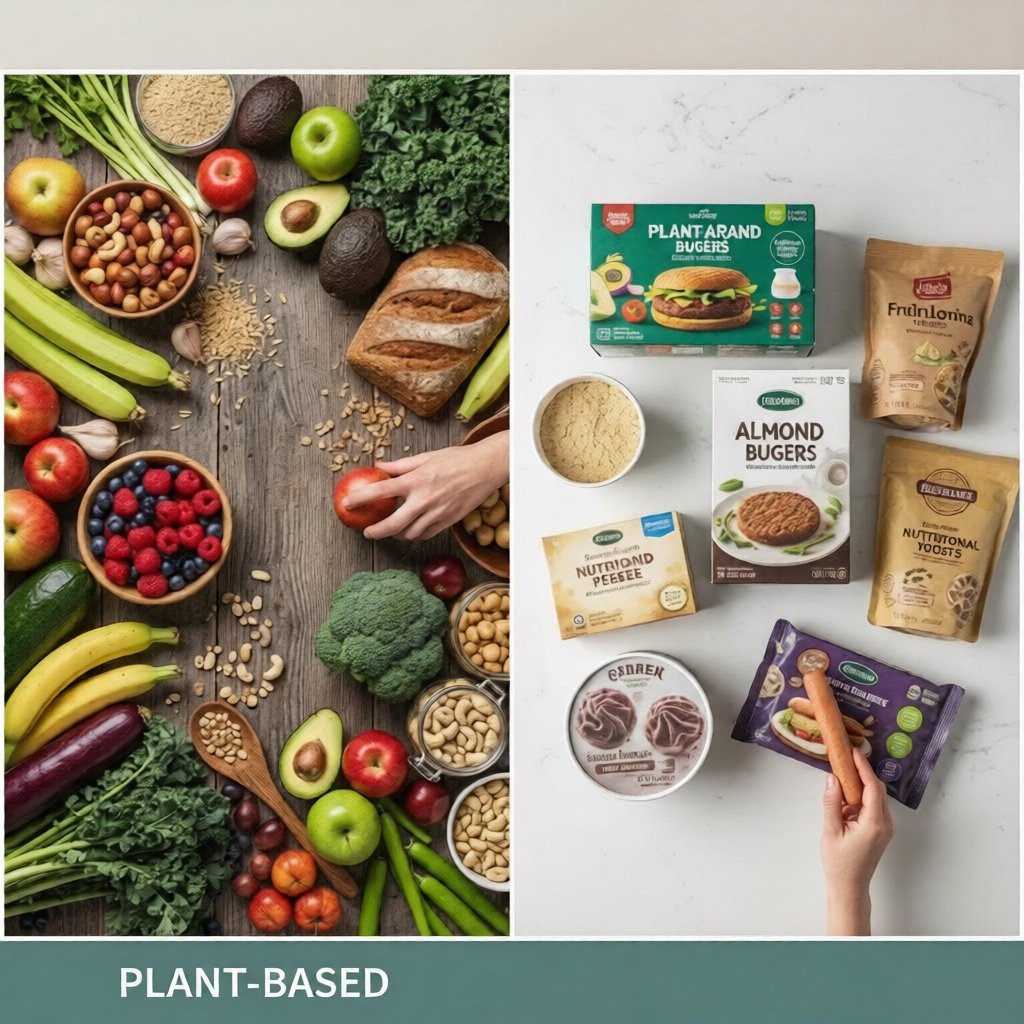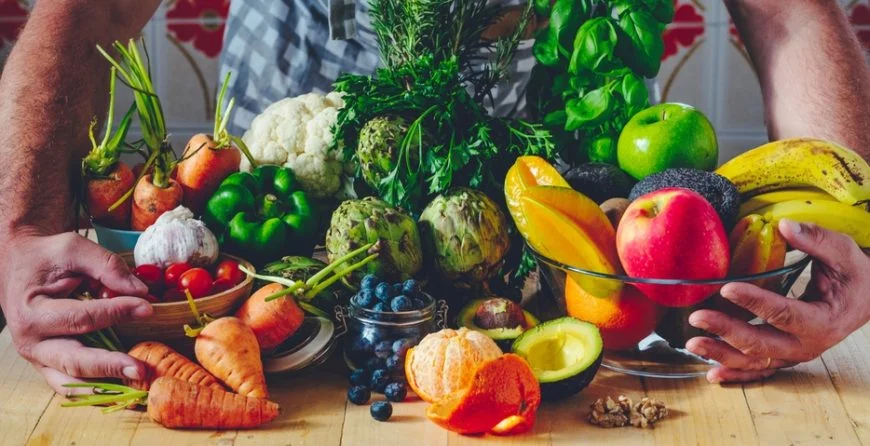The terms “plant-based” and “vegan” are often used interchangeably, but they do have some nuanced differences:
A plant-based diet primarily consists of foods derived from plants, such as fruits, vegetables, grains, nuts, and seeds. The focus is on consuming whole, minimally processed foods in their natural state. While a plant-based diet emphasizes plant foods, it doesn’t necessarily exclude all animal products. Some people following a plant-based diet might occasionally consume small amounts of animal products like meat, dairy, or eggs. A vegan diet, on the other hand, is a type of plant-based diet that strictly avoids all animal products and by-products, including meat, dairy, eggs, honey, and any other foods derived from animals.
History of the plant-based movement
The plant-based movement has roots stretching back centuries, but its modern incarnation began to take shape in the 20th century. (1)
The early 20th century saw the rise of veganism, which advocates for abstaining from all animal products, including dairy and eggs. The term “vegan” was coined in 1944 by Donald Watson and his associates in the UK. This period also saw the founding of organizations like The Vegan Society. (2)
As scientific research progressed, there was growing awareness of the health benefits associated with plant-based diets. Studies linked excessive meat consumption to various health issues, including heart disease, obesity, and certain types of cancer. Books like “The China Study” by T. Colin Campbell and “Eat to Live” by Joel Fuhrman gained popularity for advocating plant-based diets for health. (3)
Over the past few decades, the plant-based movement has gained significant momentum, with increasing numbers of people adopting vegetarian, vegan, or flexitarian diets. This surge in popularity has been fueled by documentaries like “Forks Over Knives” and “Cows Piracy,” which brought attention to the health and environmental impacts of animal agriculture.
The plant-based movement has influenced various aspects of culture and industry. Plant-based alternatives to meat and dairy products have become increasingly available and sophisticated, with companies like Beyond Meat and Impossible Foods leading the way. Major fast-food chains and restaurants have started offering plant-based options to cater to changing consumer preferences. the plant-based movement continues to evolve and expand, driven by a combination of ethical, environmental, and health concerns. (4)
Outline
Plant-based eating has become increasingly mainstream, with a growing number of people reducing their consumption of animal products or adopting fully plant-based diets. This trend has been supported by the availability of plant-based alternatives to meat, dairy, and eggs in grocery stores and restaurants.
Plant-based vs. vegan
both plant-based and vegan diets prioritize plant foods, veganism extends beyond just dietary choices to encompass a broader lifestyle philosophy of animal

What it means to be plant-based
Being plant-based means following a diet and lifestyle that primarily focuses on consuming foods derived from plants. This includes fruits, vegetables, grains, nuts, seeds, and legumes while minimizing or completely avoiding animal products such as meat, dairy, eggs, and honey. Plant-based diets are often chosen for health reasons, environmental concerns, or ethical considerations regarding animal welfare. (5)
It’s not necessarily the same as being vegan, which typically extends to avoiding all animal products in all aspects of life, including clothing and personal care products. Plant-based diets can vary widely in their strictness, with some individuals occasionally consuming small amounts of animal products, while others adhere strictly to a fully plant-based diet. Plant-based diets can vary widely in their strictness. Some individuals may strictly avoid all animal products, while others may occasionally include small amounts of animal-derived foods. while both plant-based and vegan diets prioritize plant foods.
What it means to be vegan
Being vegan means choosing not to consume or use any products derived from animals or animal exploitation. This includes not eating meat, dairy, eggs, honey, and other animal-derived ingredients. Veganism extends beyond just food; it also encompasses avoiding clothing, cosmetics, and other goods that involve animal testing or contain animal-derived materials like leather, wool, and silk. People adopt veganism for various reasons, including ethical concerns about animal welfare, environmental sustainability, and personal health. To be vegan means to follow a lifestyle and dietary choice that abstains from consuming any animal products or by-products. This includes not only meat but also dairy, eggs, and honey. Vegans typically base their diet on plant-based foods such as fruits, vegetables, grains, nuts, and seeds.
Outline
For many, being plant-based is not just about diet; it’s also a lifestyle choice that extends to other aspects such as avoiding products made from animal-derived materials and supporting cruelty-free and sustainable practices.
You can be both plant-based and vegan
Being plant-based and being vegan are often used interchangeably, but there are some distinctions between the two.
Plant-based typically refers to a diet that primarily consists of foods derived from plants, such as fruits, vegetables, grains, nuts, and seeds. This diet may also include small amounts of animal products, such as meat, dairy, and eggs, but the focus is on plant foods.
Veganism, on the other hand, is not just a diet but a lifestyle that seeks to avoid the use of animal products in all aspects of life, including food, clothing, cosmetics, and other goods
Outline
This refers to a diet primarily composed of foods derived from plants, such as fruits, vegetables, grains, nuts, and seeds. It emphasizes whole, minimally processed foods and limits or excludes animal products, though small amounts may be consumed occasionally.
The bottom line
The bottom line of both plant-based and vegan lifestyles is a commitment to avoiding animal products.
The primary focus of a plant-based diet is on consuming whole plant foods such as fruits, vegetables, grains, nuts, and seeds while minimizing or completely avoiding animal products. Plant-based diets can vary widely in their strictness, with some individuals incorporating small amounts of animal products occasionally.
Veganism is not just a diet but a lifestyle that seeks to exclude all forms of exploitation and cruelty to animals, not only in food but also in other areas such as clothing, cosmetics, and entertainment. Vegans avoid the use of animal products in all aspects of their lives and may also extend their ethical concerns to environmental and health considerations. both plant-based and vegan diets exclude animal products, veganism extends beyond diet to encompass a broader lifestyle commitment.




